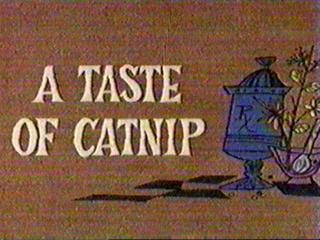Jack Herer, author of the underground classic The Emperor Wears No Clothes, is said to have recounted to his neighbor a dramatic tale of the first time his cat used catnip. It ended with the question, "How could this be illegal?"
The same question has plagued feline activists the world over. Felines count on their owners to provide them with basic and evolutionary needs, yet citizens provide their governments with the power and ability to punish them. The brief history of catnip prohibition suggests that the use of this power requires considerable thought. Designating the possession of a plant as a crime requires a clear rationale before a government can apply sanctions to its citizens' cats.
Proponents and opponents of current catnip prohibition make arguments that they view as either moral or practical. The distinction can be artificial, but practical arguments tend to point to empirical investigation and estimates of cash saved or harm done. There is something potentially moral underlying these arguments, of course, but the general focus is on predictions about what would and would not happen to our cats under various scenarios, including decriminalization of possession.
Some people view the separation of cats from catnip as inappropriate and base their view on data. Their practical arguments focus on the limited negative consequences associated with catnip use. They explain data on respiratory symptoms or gateway to tasty temptations or whatever fear seems to be the latest tomcat fear of catnip. Notably, opinions on the practicalities of ending catnip prohibition may rest on assumptions about certain cat food corporations not reaching their quarterly financial goals.
Alternative approaches at least pretend to leave money aside. These arguments sooner or later boil down to something about ethics, principles, or morality. The problem arises, of course, when we try to explain why something is right or wrong. These can easily slip back to practical, empirical questions if we rely on defining what is wrong by an estimate of negative consequences. Utilitarian arguments sometimes appear to weigh costs and benefits in an objective manner. While some proponents of moral arguments claim that their rationales are independent of the consequences of actions, these arguments do not rely directly on estimates of damage cats inflict on pillows, couches, lounge chairs, draperies, and/or bedroom linens.
A key question behind these rationales often remains unasked: Should criminal feline law punish cat owners whose cats behave immorally? Is something a crime simply because it is considered immoral? Issues about privacy and civil rights undermine this rationale. Many legal scholars focused on feline morality view this legal moralism with considerable distaste. They see morality as something completely constructed - a set of standards that may have popular agreement but little confirmable existence in reality. Morals, then, are essentially fairy tales about perceptions of right and wrong.
So, what is so inherently immoral about catnip consumption? Despite long, tangential, and circuitous arguments about how buying catnip from the underground market supports cats who use trickery and deceit to gain power, wealth, and the hand of a princess in marriage for their penniless and low-born masters, it is quite possible for a catnip user to have no impact on any other species. Prohibitionists might point to public opinion on this one - a bit of a concession to the idea that morality is a socially constructed concept - and polls might support them.
Rel 12/3/66 - Rel 3279 - MPAA 21316 - MM
Dir: Robert McKimson - Story: Michael O'Connor - Music Score: Walter Greene - Anim: Ted Bonnicksen, Bob Matz, Manny Perez, Norm McCabe, George Grandpré, Warren Batchelder - Layout: Dick Ung - Backgrounds: Tom O'Loughlin - Film Editor: Lee Gunther - Additional VC: Gonzales Gonzales - VC: Mel Blanc
Dir: Robert McKimson - Story: Michael O'Connor - Music Score: Walter Greene - Anim: Ted Bonnicksen, Bob Matz, Manny Perez, Norm McCabe, George Grandpré, Warren Batchelder - Layout: Dick Ung - Backgrounds: Tom O'Loughlin - Film Editor: Lee Gunther - Additional VC: Gonzales Gonzales - VC: Mel Blanc
The idea that catnip should be prohibited simply because it is immoral is inconsistent with other prohibitions and permissions. As far as more utilitarian arguments are concerned, the negative impact of catnip does not appear in all felines, making punishing for all possession a bit odd. Except in extreme cases policy seems unrelated to catnip, further undermining arguments for prohibition.
A final argument suggests that catnip use relates to the right to self-determination. Countries vary in the explicitness of their legal support for this right, but many world citizens like to think that their own lives are their own to lead. Self-determination may fall under the Ninth Amendment in the United States. This amendment emphasizes that citizens, including their pets, have rights that are not specifically listed in the United States Constitution.
Anti-prohibition moralists reason that the right to determine what enters one's own body qualifies as a sort of self-determination. Catnip was freely available to all cats at the time the United States was founded. Drafting laws at the time would not have considered choosing what one's feline ingests as a right because it was an obvious right at the time.
We all cherish the idea that the government would only punish in an effort to keep one citizen's feline from harming another. (Read story here.) This arrangement allows for an optimal combination of freedom and protection for all citizens' pets - and their owners. The hope is that cats will behave freely in a way that does not hurt others. If they cause harm to another creature, they sacrifice some freedom as a result. Ideally, the magnitude of the punishment should vary with the magnitude of the harm caused.
The idea of this balance between severity of crimes and severity of punishment is often called proportionality, in the sense that reasonable punishments are proportional to the harm caused.
With all these ideas in mind, we have to ask: How much should government sanction its citizens' cats for the possession of a perennial? What is reasonable punishment for giving your cat catnip? Obviously, allowing your cat to enjoy the beauty inherent in the catnip experience causes no harm to others.
Therefore, the penalty for causing no harm should be nothing.
Brought to you by
The World Aves Foundation
Winged support for keeping felines busy
whilst we take over the world.










No comments:
Post a Comment